Last Updated on November 24, 2021
It happens. You’ll replace your tire with a spare and drive on it to get home after a long day of work. It’ll be late by the time you parallel park a few blocks away because everyone else took the close spots.
You go to bed thinking “I’ll go to the tire shop tomorrow” and wake up a week later still rolling on the same spare donut tire.
If you are a car enthusiast, you probably would take time off work to get the flat tire fixed (or use it as an excuse to get a new set of shoes for your ride) because you can’t bear the uneven tire wear and the decrease in lateral grip on your BMW! But if you’re a normal person, you might not even notice or care.
This brings to light a couple questions: How long can/should you drive on a spare tire? And how fast can you safely go?
Read Also: Seized or Rounded Off Lug Nut? (Here’s How to Remove It)
Full-Size Spare
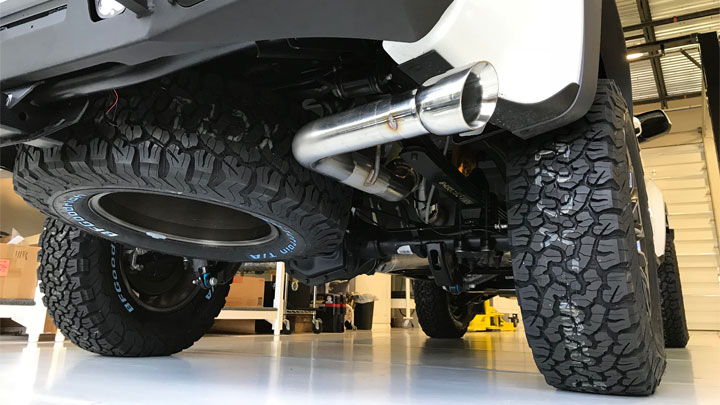
How Far Can You Drive?
This all depends on the type of tire you have and how old it is. If your car is 15 years old and you’re the third owner, you might look in the spare tire compartment and notice a full-size spare that’s rusted out.
The rubber may be dry and cracked, which won’t help you when you need to evade a moose crossing the road, but I know from personal experience they’ll still get you to where you’re going. Maybe avoid the highway and take side roads just to be safe?
Related: Is It OK Drive on a Flat Tire?
How Fast Can You Go?
This also depends on the brand and age of your spare. Many truck drivers and off-road enthusiasts have 5 full-size tires on their vehicles. This way, you can rotate the five tires so they wear evenly, increasing the life of all 5 by 20%! Just make sure they are all balanced.
If this is the case, you’ll be able to go as far and as fast as you would with normal tires. You’ll just want to get that flat tire fixed ASAP so you don’t forget about it and are left with a flat tire as your spare when you have another blowout.
See Also: Speedometer Not Working? (Here’s Why)
Donut Spare (Space-Saver)
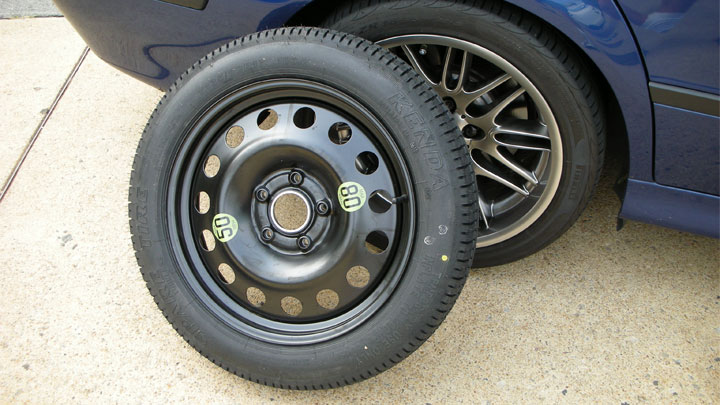
How Far Can You Drive?
From my research, it seems most mechanics agree that you shouldn’t drive more than 70 miles on a donut tire. It’s unclear whether this is because of the physical limitations of the space saver tire or simply because 70 miles is how long it should take you to get home and then to the tire shop the next day.
In any case, if you’ve ever driven on a space saver “donut” tire, you know how inadequate they are for daily driving and they are far from confidence-inspiring. However, they can weigh as little as 20 pounds, which makes your car far more fuel-efficient than if you were lugging around a full-size spare tire and wheel!
Note: Your space-saver spare likely won’t be equipped with a tire pressure monitor sensor so don’t worry if your TPMS light comes on in your dash. Once your original tire is fixed and the wheel is mounted, the TPMS should reset itself after a bit and the light will go off.
How Fast Can You Go?
Short Answer: I wouldn’t push it.
Longer Answer: These tires are obviously much smaller than your current flat tire that you just replaced, and you might even notice that your car is a bit lower to the ground on the recently-replaced corner.
This will cause uneven tire wear, which will only become more severe as you add speed to this equation.
Most of these tires have a disclaimer listed on the rim stating “Do not exceed 50mph on this wheel”. This recommendation should be followed because an engineer tested these wheels at higher speed limits, and I’m guessing something bad happened.
Run-Flat Tire (After a Puncture)
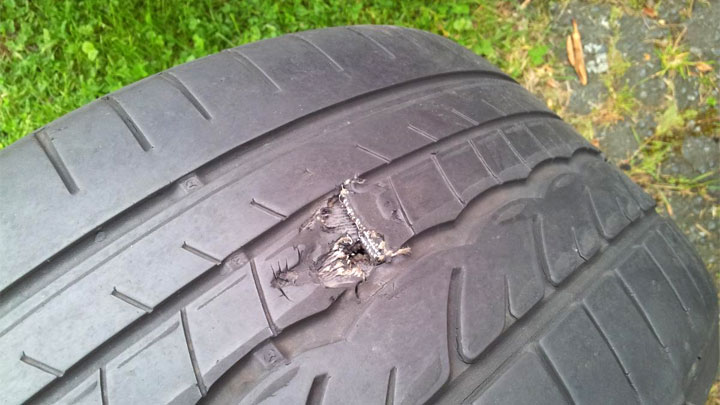
A Run-Flat is another of the spare tire types and is a good option for those that want to save weight in their vehicles, ditching the donut altogether along with the repair gear associated.
Contrary to popular belief, these tires can still be punctured and they should still be treated with care.
How Far Can You Drive?
You can drive about 50 miles on a punctured run-flat-tire. This is because the structure is built into the tire’s sidewalls, which allow your car to continue rolling down the road.
Obviously, if it is an extremely rough road, you might experience different results as you wear down the sidewall structure but I would keep it to 50 miles. You don’t want to end up stranded on the side of the road.
How Fast Can You Go?
Bridgestone (one of the four largest tire manufacturers) suggests one shouldn’t exceed 50 mph on a punctured run-flat-tire. If you exceed this speed, your vehicle’s handling, braking, and suspension dynamics could be compromised.
Can You Repair a Run-Flat Tire?
You can patch anything, but it is almost impossible to determine whether or not a run-flat tire has been damaged on the inside. This is why most tire manufacturers suggest you replace your run-flat tires as soon as possible after a puncture.
How Often Should a Spare Tire Be Replaced?
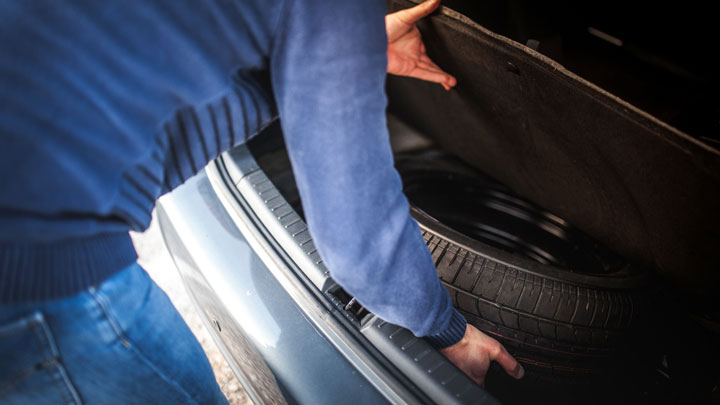
Most tires have an expiration date that averages 10 years from the date of manufacture. This means that you should replace your tire if the car is more than 10 years old and the tire is the very same that came from the factory.
Also, look closely at the sidewall of the tire. Is it cracked? Dry? Is there very little tread left? If you answered “yes” to any of these questions, go ahead and replace that tire. Use this helpful guide to get you started.
Treat your spare tire as a band-aid, not a permanent solution. It’s there to get you home after a stressful drive. Nothing more, nothing less. Also, make sure you check your tire pressure regularly so you are within the manufacturer’s recommended PSI.
See Also: How to Do a Burnout in an Automatic

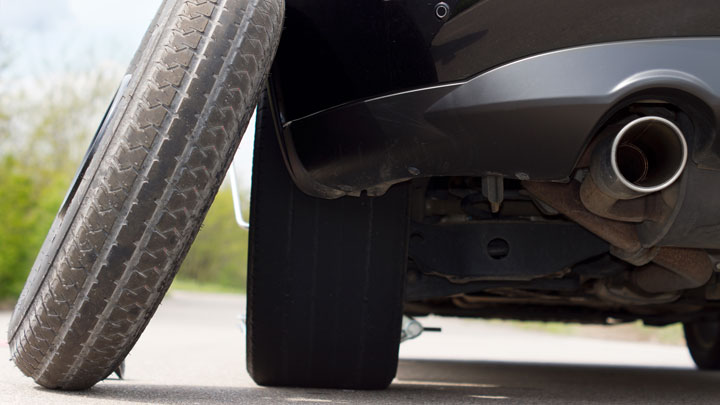
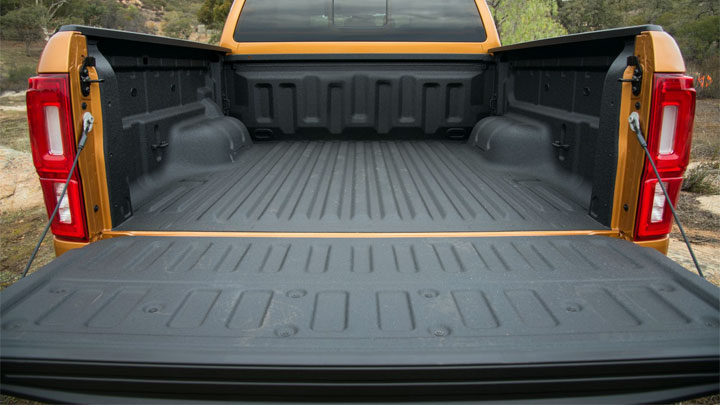
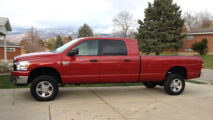

The idea that the weight of a spare has any real effect on fuel consumption has long been debunked. And, the extra weight in 4 run flat tyres more than equals weight of one spare.